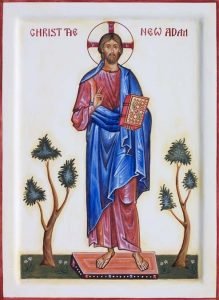 I have been sharing ideas about why we should be aware of the Fathers of the Church and what they taught and wrote. They are the foundation for our understanding not only of the New Testament (NT) but also our worship as a Church. We also realize from their example, that we have to wrestle with the dog-mas of the Church so that we can come to a real un-derstanding of them and internalize their meaning. This process makes our faith real.
I have been sharing ideas about why we should be aware of the Fathers of the Church and what they taught and wrote. They are the foundation for our understanding not only of the New Testament (NT) but also our worship as a Church. We also realize from their example, that we have to wrestle with the dog-mas of the Church so that we can come to a real un-derstanding of them and internalize their meaning. This process makes our faith real.
No Christian’s ideas or practices have been shaped in a familial, cultural, ecclesiological or theological vacuum. Theological knowledge, awareness, practice and, occasionally, prejudice are formed within a number of contexts. Purposefully and systematically moving out of these familiar boundaries, that is, taking a theological voyage to other times, places and personalities, rebukes the tendency of us all to think that we are the only people who genuinely comprehend the truth and who practice it faithfully. It is the height of arrogance to believe that we, and only we, have a corner on the whole truth. Exposure to foreign theological terrain can surprisingly highlight the fissures in our own theological understanding and remind us of the continuing need to listen to other voices carefully and respectfully. This doesn’t mean, however, that we immediately abandon those things that we believe when we hear different opinions. We study the thoughts of others, just as the Fathers of the Church did, in order to refine our own thoughts. It is critical, I believe, that we get to a point where we formulate our own set of beliefs and then not become insecure when others express a difference of opinion.
However, a broadening and deepening of theological perspective, insight and sympathy is not the only happy fruit of working outside of one’s home theological turf. A thorough immersion in patristic theology will continually put us toward the center of the Gospel and help to guard against the danger of transforming peripheral issues into the heart of the matter.
As I have attempted to present, the Fathers wrestled with their understanding of God, Christ and creation and came, through their study and debate with other Father, to the understanding of our faith that we now profess. What this tells me is that they were deeply concerned about the faith and gave time to coming to a true and deep understanding of that faith. We do well to imitate them. What do you really believe?
